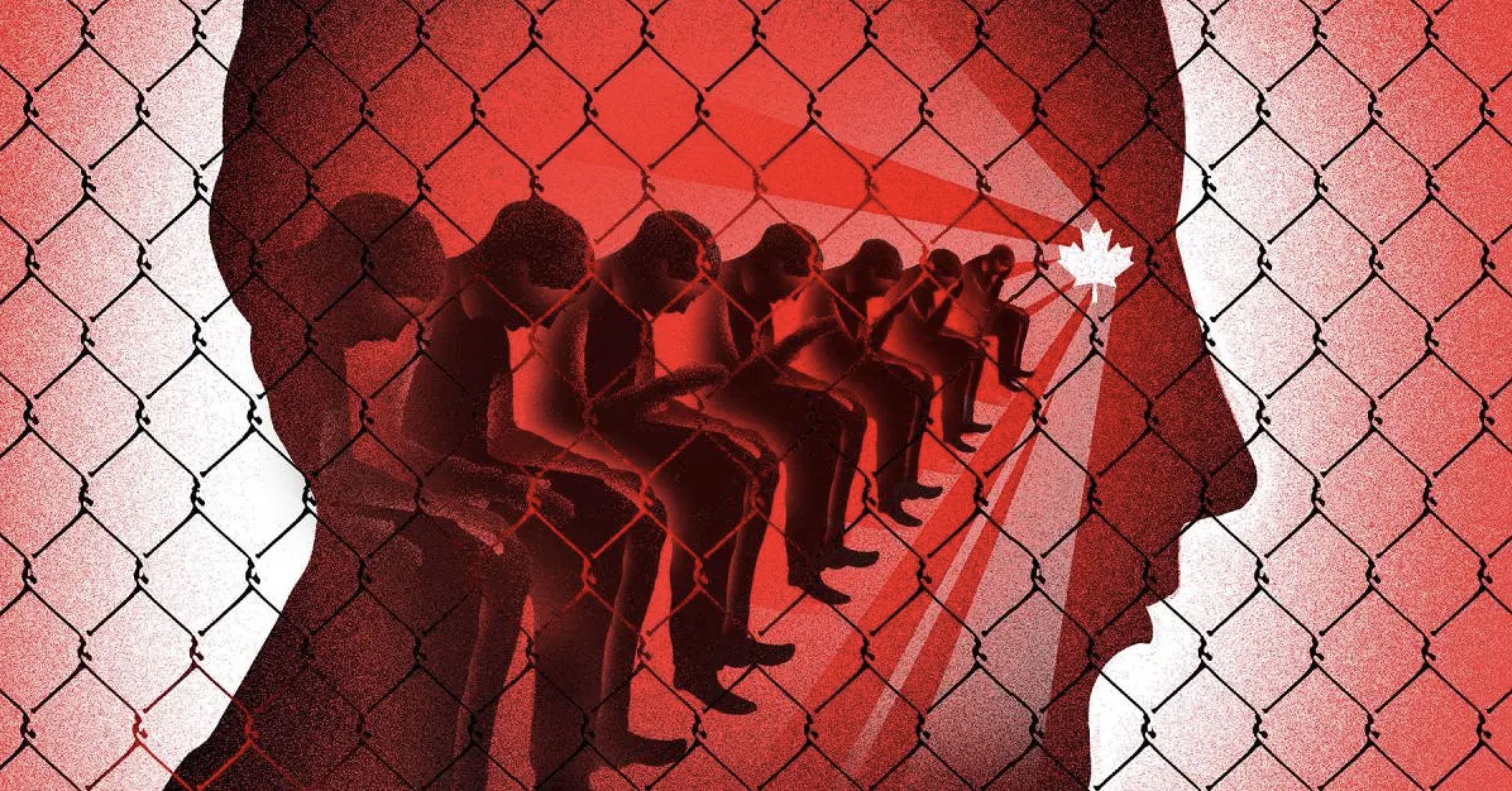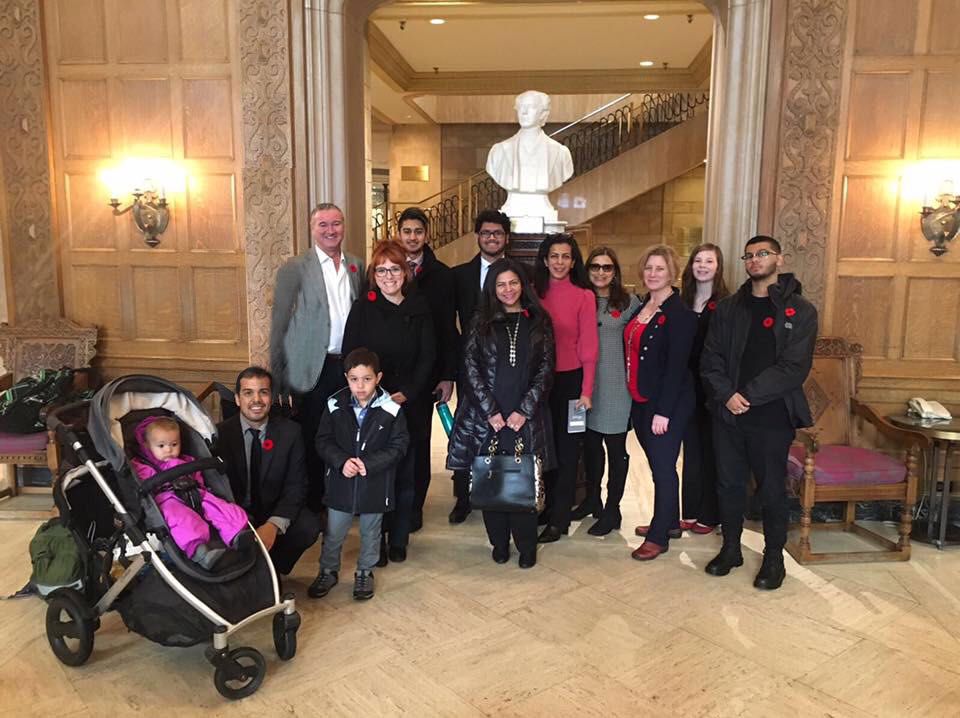
Illustration made for Human Rights Watch in 2021. Credit: Brian Stauffer
By Patricia Poirier
The International Civil Liberties Monitoring Group (ICLMG) launched the Clearinghouse project on June 18, 2008, which marked the first-year anniversary of the coming into effect of the Canadian no-fly list or the Passenger Protect Program. The aim of the project was to investigate the border control practices used to screen travellers at Canadian airports and Canadian-US border crossings, and their impact on the privacy, civil liberties and human rights of individuals living in Canada, whether citizens, landed immigrants or asylum- seekers.
We had been witnessing a growing number of border incidents, as well as a change in the nature of these incidents, coinciding with the implementation of the no-fly list program and the linking in real-time of Canadian and US law enforcement databases and watchlists. The well-documented racial and religious profiling and targeting of Muslims and members of Arab communities was now expanding to other groups, including academics as well as peace, labour and justice activists.
It could be said that the no-fly list program was the most visible initiative resulting directly from the growing efforts to integrate Canadian and US security systems within the framework of the 2001 Smart Border Declaration, and the subsequent 2005 Security and Prosperity Partnership. They included: the Nexus program, the National Risk Assessment Centre, the High-Risk Traveller Identification Initiative and the Integrated Border Enforcement Teams.
In December 2011, Canada and the US unveiled the Beyond the Border agreement and quietly began implementing initiatives towards establishing a North American Security Perimeter. This included expanding trusted traveller programs, as well as enhancing integrated law enforcement and information-sharing cooperation which raised many privacy concerns.
With some of our members and partners – the British Columbia Civil Liberties Association, the Canadian Association of University Teachers, the Canadian Labour Congress, the Canadian Union of Public Employees and the Ligue des droits et libertés – we wanted first-hand information that would inform our advocacy work and bring the issues of surveillance and watchlists to the attention of the public at large. The project combined research, policy analysis and first-hand accounts of travellers who were barred from flying, intercepted or detained. Over a two-year period, we filed access to information requests and met with government as well as with federal and some provincial privacy commissioners and their staff.
We found and analyzed countless reports from both sides of the border regarding the dizzying number of agreements, measures, programs or databases of the Canada Border Services Agency, the Canadian Air Transport Security Authority, the RCMP, Transport Canada and the Canadian Security Intelligence Service. To find out how these different programs and regulations were impacting travellers, we set up a website and a toll-free phone number to allow people to report their encounters with airlines, transport and border officials. The information collected was kept confidential unless participants agreed to be identified. Over 70 stories were thus collected.
We released the 55-page final report in February 2010, on the eve of the opening of the Vancouver Winter Olympics.1ICLMG et al., Report of the Information Clearinghouse on Border Controls and Infringements to Travellers’ Rights, ICLMG, February 2010. It was particularly timely as there were several reports of visitors who were questioned and detained upon their arrival at the local airport or at the Canada-US border. Free speech activists were especially targeted, including well-known US broadcaster Amy Goodman. Our report listed the growing array of databases and watchlists used to keep tabs on North American travellers, described how information was collected, sifted, cross-referenced, stored and shared with government agencies on both sides of the border, and with other foreign governments.
Since September 11, 2001, identifying, assessing and mitigating risk were central to border management practices. The CBSA had already acknowledged that its goal was to create a “virtual border” that is closest to the possible source of risk, and away from the traditional physical border.
We found that:
- Racial and religious profiling is a fact of life at the Canada-US border
- There was a real potential for abuse and violation of travellers’ rights due to the discretionary and arbitrary powers granted to officials of the CBSA
- Most people will never know why they are targeted
- There was no credible redress mechanism for passengers who were repeatedly questioned, detained and sent to secondary screening at the airport, or for individuals “randomly” stopped or turned back at the border
- Many, especially Muslims, said they no longer travelled outside Canada for fear of being targeted and that Maher Arar’s ordeal was often on their minds
- The lack of any meaningful redress mechanism exacerbated the potential for abuse and violation of Charter rights, notably the rights to privacy, mobility and equality
The ICLMG recommended a number of actions to the government and members of Parliament, who had virtually ignored the issue of the no-fly list since its inception, including the following:
- The Government should acknowledge that racial and religious profiling is a determining factor in the way individuals are treated and caught by no-fly lists and other watchlists. It must review these unconstitutional practices that violate the Canadian Charter of Rights and Freedoms.
- The no-fly list program (which was expanded by the imposition of the US Secure Flight Program on Canadian airlines planned for December 2010), should be reviewed by Parliament in light of the Charter because of a lack of due process and judicial review.
- An independent watchdog should be set up to monitor the Canada Border Services Agency in light of its discretionary and arbitrary powers, and the lack of any accountability mechanism, as recommended by Justice O’Connor in his 2006 inquiry into the case of Maher Arar.
- Parliament should address concerns over privacy and the deployment of biometrics and other technologies targeting travellers.
Finally, our report rightly predicted that the situation would be made worse by the North American Security Perimeter Agreement (released in December 2009) which for all practical purposes established one harmonized border protection and national security regime for all of Canada and the US.
In August 2022, the Federal Court upheld the constitutionality of the no-fly list, saying it did infringe on mobility rights but that the breach was justified. It ruled: “Ensuring safety in air transportation and limiting air travel for terrorist purposes necessarily involves some infringement of mobility rights.” We disagree.
ICLMG continues to fight to abolish Canada’s no-fly list, end Canadian government compliance with the US Secure Flight program, and establish an independent complaint body for the CBSA.
Patricia Poirier is a former journalist who has been involved with human rights, justice and privacy issues as a researcher and communications consultant in Ottawa, Moscow, Jerusalem and Montreal where she volunteers.
Since you’re here…… we have a small favour to ask. Here at ICLMG, we are working very hard to protect and promote human rights and civil liberties in the context of the so-called “war on terror” in Canada. We do not receive any financial support from any federal, provincial or municipal governments or political parties. You can become our patron on Patreon and get rewards in exchange for your support. You can give as little as $1/month (that’s only $12/year!) and you can unsubscribe at any time. Any donations will go a long way to support our work. |
Footnotes
- 1ICLMG et al., Report of the Information Clearinghouse on Border Controls and Infringements to Travellers’ Rights, ICLMG, February 2010.




